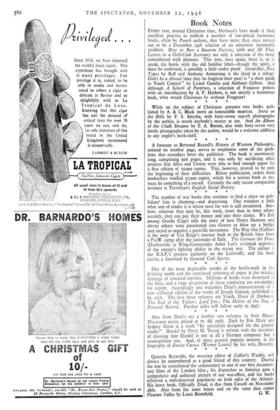Book Notes
EVERY year, around Christmas time, Methuen's have made it their excellent practice to publish a number of low-priced humorous books, often by Punch authors, that have more than once turned out to be a December 24th solution of an otherwise intractable problem. How to Run a Bassoon Factory, io66 and All That, Letters to a Golf-Club Secretary are only a selection of the many remembered with pleasure. This year, once again, there is, so to speak, the bottle with the old familiar label—though the spirit, it must be confessed, is possibly a little under proof. Good-Bye, Nice Types by Raff and Anthony Armstrong is the third in a trilogy. Don't be a Afreud (may they be forgiven their pun) is " a short guide
to Youth Control " by Lionel Gamlin and Anthony Gilbert. And although A School of Purposes, a selection of Fougasse posters with an introduction by A. P. Herbert, is not strictly a humorous book, what would Christmas be without Fougasse? * * * * While on the subject of Christmas presents two books pub- lished by A. & C. Black merit an honourable mention. Snow on the Hills by F. S. Smythe, with forty-seven superb photographs by the author, is worth anybody's money at 205. And An Album of the Chalk Streams by E. A. Barton, also with forty-seven very lovely photographs taken by the author, would be a welcome addition to any angler's book-shelf. * * * *
A footnote to Bertrand Russell's History of Western Philosophy, noticed on another page, serves to emphasise some of the prob- lems that nowadays beset the publisher. The book is enormously long, comprising 916 pages, and it was only by sacrificing other projects that Allen and Unwin were able to find enough paper for a first edition of 19,000 copies. This, however, proved to be only the beginning of their difficulties. Before publication, orders from booksellers totalled 37,000 copies, which for a serious book at 215. must be something of a record. Certainly the only recent comparable
instance is Trevelyan's English Social History. * * * * The number of war books that continue to find a place on pub- lishers' lists is alarming—and depressing. One wonders a little what sort of reader it is whose taste for war is still unsatiated. Any- how, whoever they may be, this week, more than in most others recently, they can pay their money and take their choice. We Fell among Greeks (Cape) tells the story of how Denys Hamson and eleven others were parachuted into Greece to blow up a bridge and stayed to organise a guerrilla movement. The Way Out (Collins) is the story of Uys Krige's journey back to the British lines from
a P.o.W. camp after the surrender of Italy. The German Air Force (Duckworth) is Wing-Commander Asher Lee's technical appraisal of the enemy's fighting ability in the recent war. The author is the R.A.F.'s greatest authority on the Luftwaffe, and his book
carries a foreword by General Carl Spaatz. * * * *
One of the most deplorable results of the bottle-neck in the printing world and the continued rationing of paper is the existing shortage of standard reprints. Millions of books were destroyed in the blitz, and a large proportion of those reprinting are ear-marked for export. Accordingly one welcomes Dent's announcement of a new collected edition of the works of Joseph Conrad, published at 6s. each. The first three volumes are Youth, Heart of Darkness, The End of the Tether ; Lord rim ; The Mirror of the Sea, A
Personal Record. Further titles will follow early in 1947. * * * * Also from Dent's are a further two volumes in their Master Musicians series, priced at 7s. 6d. each. Bach by Eva Mary and Sydney Grew is a work " by specialists designed for the general reader." Handel by Percy M. Young is written with the intention of showing that Handel is not at all a German composer but a cosmopolitan one. And, of more general popular interest, is the biography of Enrico Caruso (Werner Laurie) by his wife, Dorothy. * * * * Quentin Reynolds, the associate editor of Collier's Weekly, will always be remembered as a good friend of this country. During the war he contributed the commentary to one of our best documen- tary films of the London blitz ; his dispatches to America gave a sympathetic and unbiased picture of our war-effort, and his books achieved a well-deserved popularity on both sides of the Atlantic. His latest book, Officially Dead, is due from Cassell on November 28th. Also from the same house and on the same date comes Pleasant Valley by Louis Bromfield. G. W.


































 Previous page
Previous page